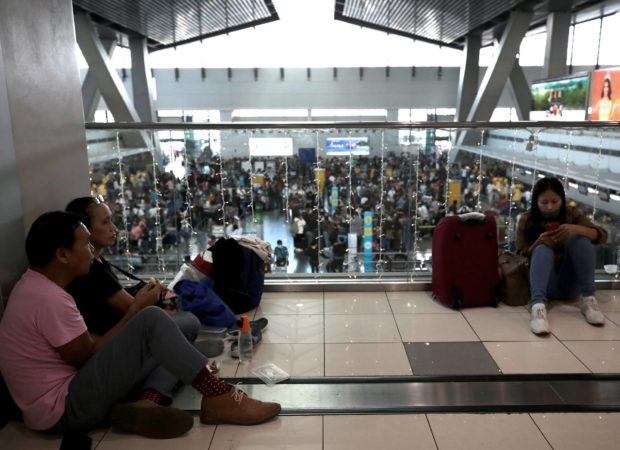
WAITING IN LINE Passengers queue at Ninoy Aquino International Airport Terminal 3 in Pasay City as they wait to board their flights following the resumption of airport operations on Monday, Jan. 2, 2023. INQUIRER file photo / RICHARD A. REYES
MANILA, Philippines — A transport advocate group has urged passengers affected by a technical issue that kept flights across the country either grounded or diverted on New Year’s Day to file for damages against the Civil Aviation Authority of the Philippines (CAAP).
Commuter network The Passenger Forum (TPF) in a statement on Tuesday said that CAAP must be held liable for making the worst New Year air transport situation in the country’s history.
According to TPF convener Primo Morillo, passengers cannot get any compensation because the flight cancellations and delays were not caused by the airliners, adding that the current Air Passenger Bill of Rights only provides compensation when airlines are at fault.
“This is probably the worst New Year for Filipino air passengers. Instead of going back happy from festivities and family gatherings, they were greeted with flight delays and cancellations. Worse, as airlines are not to blame, they cannot get any compensation,” Morillo said.
“With this airport glitch, we cannot blame anyone but the government institutions in charge of ensuring the smooth operations of air traffic in the country. As the CAAP is a GOCC [government-owned and controlled corporation], they have their own funds and thus, they must pay for the damages incurred by their shortcomings,” he added.
When flights were grounded before 10:00 a.m. of Sunday, January 1, there were rumors that the problems were caused by a power outage that affected the Communications, Navigation and Surveillance Systems for Air Traffic Management (CNS/ATM) operated by the CAAP.
READ: Air traffic system glitch diverts all flights in Manila
The CNS/ATM basically allows air traffic managers in the country, or in the Manila flight information region (FIR) to communicate with commercial airplanes and direct traffic for an efficient and safe flow.
However, in a late night briefing on the same day, both Transportation Secretary Jaime Bautista and CAAP Director General (ret.) Capt. Manuel Tamayo clarified that commercial power supply was available, and it was the uninterruptible power supply (UPS) of both the main power source and the backup source that malfunctioned.
Without the CNS/ATM, traffic managers would be in the blind regarding the country’s aircraft capacity, prompting the CAAP to eventually rely on radar systems like the Tagaytay radar to resume operations on a limited basis by 4 p.m.
Tamayo said they tried to override the power supply by installing an automatic voltage regulator, but instead of getting the recommended 220 volts, the system operated on 380 volts, thus forcing a shutdown of the entire system. The overvoltage, however, left some damage on key components, like satellite dishes.
READ: UPS failure caused glitch at CAAP’s Air Traffic Management Center, says DOTr
Morillo noted that it is not only the inconvenience that bothered passengers, but also additional financial expenses that come with delayed flights like a longer hotel accommodation, food, and other things that demand compensation.
“Overly delayed and canceled flights result to canceled events. It also means additional nights of hotel accommodation, food and other expenses. These are clearly things that demand damages,” he added.
On Monday, Albay 2nd District Rep. Joey Salceda asked the government to give passengers the option of fully reimbursing their tickets after the glitch, mentioning the same predicament that such technical issues are not covered by full reimbursements.
Salceda said that if 66,000 passengers were affected — 56,000 on January 1 and 10,000 more on January 2 — the government might need to shell out P660 million if the passengers’ tickets are pegged at P10,000 each.
READ: Salceda: After flight glitches, gov’t should offer full refund

